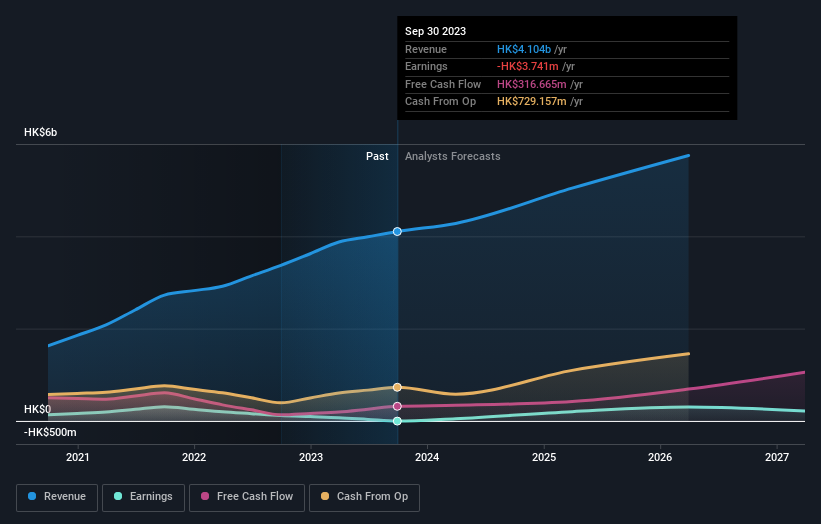Stock Analysis
- Hong Kong
- /
- Consumer Services
- /
- SEHK:2138
EC Healthcare (HKG:2138) Top Key Executive Chi Fai Tang, the company's largest shareholder sees 11%reduction in holdings value

Key Insights
- Insiders appear to have a vested interest in EC Healthcare's growth, as seen by their sizeable ownership
- Chi Fai Tang owns 61% of the company
- 11% of EC Healthcare is held by Institutions
Every investor in EC Healthcare (HKG:2138) should be aware of the most powerful shareholder groups. We can see that individual insiders own the lion's share in the company with 61% ownership. In other words, the group stands to gain the most (or lose the most) from their investment into the company.
As a result, insiders as a group endured the highest losses after market cap fell by HK$201m.
Let's take a closer look to see what the different types of shareholders can tell us about EC Healthcare.
View our latest analysis for EC Healthcare

What Does The Institutional Ownership Tell Us About EC Healthcare?
Institutions typically measure themselves against a benchmark when reporting to their own investors, so they often become more enthusiastic about a stock once it's included in a major index. We would expect most companies to have some institutions on the register, especially if they are growing.
We can see that EC Healthcare does have institutional investors; and they hold a good portion of the company's stock. This implies the analysts working for those institutions have looked at the stock and they like it. But just like anyone else, they could be wrong. If multiple institutions change their view on a stock at the same time, you could see the share price drop fast. It's therefore worth looking at EC Healthcare's earnings history below. Of course, the future is what really matters.

Hedge funds don't have many shares in EC Healthcare. From our data, we infer that the largest shareholder is Chi Fai Tang (who also holds the title of Top Key Executive) with 61% of shares outstanding. Its usually considered a good sign when insiders own a significant number of shares in the company, and in this case, we're glad to see a company insider play the role of a key stakeholder. For context, the second largest shareholder holds about 4.8% of the shares outstanding, followed by an ownership of 1.6% by the third-largest shareholder.
While studying institutional ownership for a company can add value to your research, it is also a good practice to research analyst recommendations to get a deeper understand of a stock's expected performance. There are a reasonable number of analysts covering the stock, so it might be useful to find out their aggregate view on the future.
Insider Ownership Of EC Healthcare
While the precise definition of an insider can be subjective, almost everyone considers board members to be insiders. Management ultimately answers to the board. However, it is not uncommon for managers to be executive board members, especially if they are a founder or the CEO.
I generally consider insider ownership to be a good thing. However, on some occasions it makes it more difficult for other shareholders to hold the board accountable for decisions.
It seems that insiders own more than half the EC Healthcare stock. This gives them a lot of power. Given it has a market cap of HK$1.7b, that means they have HK$1.1b worth of shares. Most would be pleased to see the board is investing alongside them. You may wish todiscover (for free) if they have been buying or selling.
General Public Ownership
The general public-- including retail investors -- own 28% stake in the company, and hence can't easily be ignored. While this size of ownership may not be enough to sway a policy decision in their favour, they can still make a collective impact on company policies.
Next Steps:
While it is well worth considering the different groups that own a company, there are other factors that are even more important. Be aware that EC Healthcare is showing 2 warning signs in our investment analysis , you should know about...
But ultimately it is the future, not the past, that will determine how well the owners of this business will do. Therefore we think it advisable to take a look at this free report showing whether analysts are predicting a brighter future.
NB: Figures in this article are calculated using data from the last twelve months, which refer to the 12-month period ending on the last date of the month the financial statement is dated. This may not be consistent with full year annual report figures.
Valuation is complex, but we're helping make it simple.
Find out whether EC Healthcare is potentially over or undervalued by checking out our comprehensive analysis, which includes fair value estimates, risks and warnings, dividends, insider transactions and financial health.
View the Free AnalysisHave feedback on this article? Concerned about the content? Get in touch with us directly. Alternatively, email editorial-team (at) simplywallst.com.
This article by Simply Wall St is general in nature. We provide commentary based on historical data and analyst forecasts only using an unbiased methodology and our articles are not intended to be financial advice. It does not constitute a recommendation to buy or sell any stock, and does not take account of your objectives, or your financial situation. We aim to bring you long-term focused analysis driven by fundamental data. Note that our analysis may not factor in the latest price-sensitive company announcements or qualitative material. Simply Wall St has no position in any stocks mentioned.
About SEHK:2138
EC Healthcare
An investment holding company, engages in the provision of medical and healthcare services in Hong Kong, Macau, and the People’s Republic of China.
Good value with reasonable growth potential.

